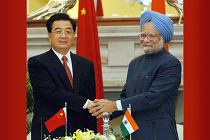Responding to an assertive China
No longer can New Delhi afford to live in denial about the rising influence of the Chinese juggernaut
 Courtesy: DMylesCullen
Courtesy: DMylesCullen
No longer can New Delhi afford to live in denial about the rising influence of the Chinese juggernaut
 Courtesy: Frances Voon/Flickr
Courtesy: Frances Voon/Flickr
The Sundarbans, one of world’s most endangered eco-systems, sits on the sensitive border between India and Bangladesh, and the issues that surround it have the potential to either advance or regress the relationship between the two neighbours
 Courtesy: John L. Beeman
Courtesy: John L. Beeman
The second part of Admiral Bharathan’s piece on the importance of maritime governance in India. In this part, the author highlights the creation of institutions and adaptation of rules and regulations towards governance and management of the nation
 Courtesy: isa_adsr/Flickr
Courtesy: isa_adsr/Flickr
Today, Kashmir is very much part of the cauldron that is "Af-Pak", the storm that is raging across the Pashtun belt in Pakistan and Afghanistan. As in Af-Pak, the base for the jihad that is being waged in Kashmir mainly comprises a small fringe of a single community – the Valley Sunnis.
 Courtesy: Indian Navy
Courtesy: Indian Navy
India has several crucial maritime stakeholders, yet she remains ill-equipped to respond to any sea-borne calamity. Maritime governance is the need of the hour
 Courtesy: Haqeeqat.org
Courtesy: Haqeeqat.org
A stable army in Pakistan, whether back in the barracks or in the presidential palace, means peace with India.
 Courtesy: PresidentIR
Courtesy: PresidentIR
The leaders of Turkey and Brazil recently voted against sanctioning Iran, concluding that Iran's leaders do not intend to violate their most important Nuclear Non-Proliferation Treaty obligation. India, as a member of NAM, should also concede.
 Courtesy: Zimbio
Courtesy: Zimbio
China has now clearly emerged as a major world power and India needs to seriously think about how it will engage its neighbour over the twenty-first century. The future of the Sino-Indian relationship will be both competitive and collaborative as the same time.